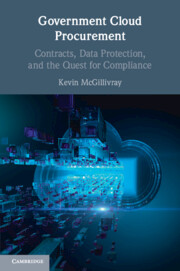Book contents
- Government Cloud Procurement
- Government Cloud Procurement
- Copyright page
- Dedication
- Contents
- Figures
- Tables
- Preface
- Acknowledgements
- Abbreviations
- Part I Subject Matter
- Part II Legal Requirements and Adoption of Government Cloud
- 3 Government Cloud Adoption
- 4 Location Independence, Jurisdiction, and Law Enforcement Access to Cloud Computing Services
- 5 Data Privacy and Data Protection Issues in Cloud Computing
- Part III Private Ordering and Cloud Computing Contracts
- References
- Index
3 - Government Cloud Adoption
Challenges and Obligations
from Part II - Legal Requirements and Adoption of Government Cloud
Published online by Cambridge University Press: 10 December 2021
- Government Cloud Procurement
- Government Cloud Procurement
- Copyright page
- Dedication
- Contents
- Figures
- Tables
- Preface
- Acknowledgements
- Abbreviations
- Part I Subject Matter
- Part II Legal Requirements and Adoption of Government Cloud
- 3 Government Cloud Adoption
- 4 Location Independence, Jurisdiction, and Law Enforcement Access to Cloud Computing Services
- 5 Data Privacy and Data Protection Issues in Cloud Computing
- Part III Private Ordering and Cloud Computing Contracts
- References
- Index
Summary
This chapter evaluates the unique obligations governments have when they commit citizen data to cloud service providers. In particular, the chapter focuses on how the responsibilities of governments are different than other types of cloud computing users focusing on specific procurement obligations, and other legal requirements.
The chapter also evaluates issues related to “data sovereignty”, outsourcing of government functions, and the potential risk to citizens from outsourcing critical infrastructure. Further, barriers that governments face when procuring cloud computing services including data localization restrictions, difficulties in comparing costs to traditional IT services, and ill-suited contract templates designed for traditional IT-outsourcing being applied to cloud computing services.
The chapter also explains that since operations or services are outsourced to cloud, governments must have the means to monitor them in order to retain a certain level of control over the operations they are outsourcing. The chapter examines government procurement programs in the United States, United Kingdom, and European initiatives to adopt cloud computing at the government level.
Keywords
- Type
- Chapter
- Information
- Government Cloud ProcurementContracts, Data Protection, and the Quest for Compliance, pp. 31 - 58Publisher: Cambridge University PressPrint publication year: 2021

